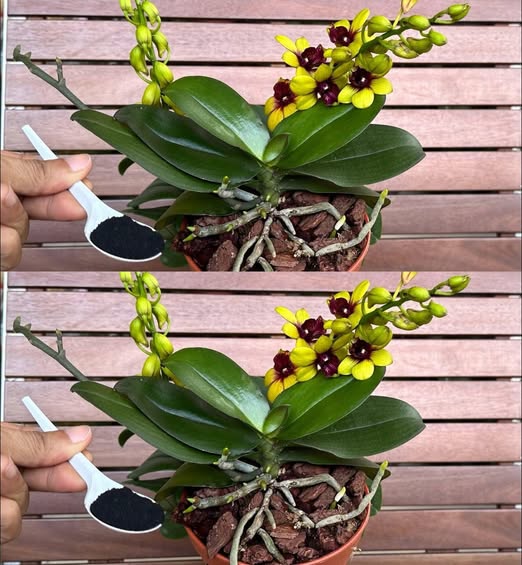Anyone who has a garden at home needs to keep pests and diseases away, as well as worrying about the quality of the soil.
The best thing about being able to grow your own plants is the guarantee that they will be healthy and organic.
Therefore, the idea of harmful pesticides or chemical fertilizers should be avoided.
In this post, we will teach you some tricks to help you take care of your garden.
Some may seem strange, but the results are incredible.
To improve the soil:
1. Bury kitchen waste in the garden
You know those fruit and vegetable peels that go straight to the trash?
And what about eggshells, orange pulp and so many other compounds that we don’t value?
They are great for nourishing the soil.
To avoid bad smells and the presence of mosquitoes, place kitchen waste around the plants and cover with a little soil.
2. Adjust pH with wood ash and coffee
Soil pH varies depending on the type and quantity of plants.
If you grow vegetables and legumes, such as beets, beans and broccoli, then wood ash (from a wood stove or fireplace) is useful.
However, if you plant ericaceous plants, such as azaleas and roses, bet on coffee grounds.
3. Weed tea as fertilizer
It is rich in nitrogen and therefore helps to nourish garden plants.
Prepare the tea: boil water and add a handful of the chosen weed, leaving it to rest until it cools.
Then put it in a spray bottle and spray it on the soil.
Another option is to make a comfrey tea and place it on the plants so that the roots absorb the nutrients.
4. Use your pee to fertilize plants
That’s right!
Urine is rich in urea and nitrogen, which promote vegetation growth and are excellent for green plants and grasses, such as corn.
But don’t do it directly on the plant, as the salt in the pee can burn it.
Try to make it around or put it in a bottle to dilute with water in a ratio of 1:10, or even more.
If planting seedlings, try to place them right in the root area.
5. Vinegar as a herbicide
To combat pests, you don’t need to use chemical herbicides – just vinegar.
Place in a spray bottle and wet the weeds.
The ideal is to do this application on a warm, sunny day.
Wet the area with vinegar and then sprinkle with a little baking soda to neutralize the acidity.
In two days the problem will be solved.
6. Place oyster shells and eggshells in your garden
This helps to alkalize the soil and increase plant health.
Crush the shell and bark and throw them on the ground.
To fight diseases:
1. Bury some coins in the garden
If they are made of copper, they help prevent fungal infections.
Copper, for those who don’t know, is a popular fungicide. So just bury some coins, as they will start to release metal and kill the fungi in the soil.
2. Baking soda in the soil
The objective is the same as the previous topic: to kill fungi.
Add a tablespoon of baking soda to a glass of warm water and pour the solution into a spray bottle.
Then spray on the plant and soil.
3. Neem oil in the soil
This oil (sold in garden supply stores) prevents insects from developing and proliferating.
Mix 30 ml of neem oil with 3 liters of water.
Add a few drops of any liquid detergent.
Detergent is essential for mixing.
It will help “break down” the neem oil, allowing it to mix with the water.
Without detergent, the oil will not mix properly.
Mix the solution well and apply to the soil.
Do this once a week.
4. Use plants that repel pests
Clover or herbs such as mint and fennel deter insects.
It’s always good to have them next to your plantation.
5. Remove aphids with water and detergent
In one liter of water, add two tablespoons of detergent and mix well.
Once done, spray the plants with the mixture.
6. Control Garden Ants with Borax and Honey
Ants are not very dangerous to plants, but they can carry pests that are quite harmful.
That’s why it’s important to keep them under control.
Prepare a paste with the borax and honey mixture.
Once done, apply it to the stem of infected plants.
This will cause the ants to become dehydrated and can even destroy the entire colony if they carry some of the product back to the nest.
To promote plant health:
1. Place a nail in the tree to stimulate growth.
This tactic is very old.
People stimulate the growth of trees with nails/iron to bear fruit or flower.
Don’t worry, this won’t damage the plant, as they have self-healing powers.
2. Coconut water in the garden
Coconut contains water rich in minerals that improves root development.
Furthermore, it is rich in gibberellic acid and cytokinins, which improve seed germination and root development in cuttings.
3. Improve Fruiting with Epsom Salt (Magnesium Sulfate)
That’s right!
Epsom salt stimulates and helps many plants to bear fruit, such as peppers.
This ingredient is extremely rich in magnesium, which is a vital component of chlorophyll.
In a bottle with warm water, add 2 tablespoons of Epsom salt and shake well.
Spray the plant for two weeks.
Epsom salt is sold in pharmacies.
4. Rusty nails to help combat iron deficiency
Plant growth is determined by the presence of iron.
Iron deficiency can be caused by excessive amounts of phosphorus in the soil or high pH.
To solve the problem, place several rusty nails in the water used for watering.
Wait a while and spray the plant with this iron-rich water.
5. Put on some good music
Plants love music.
Can you believe it?
There have been several experiments that have shown that plants develop more with good quality music.
So, bet on good music.
Biologists confirm that this significantly helps their growth.
But be careful : researchers have discovered that plants prefer classical music to more upbeat songs, such as rap or rock.



